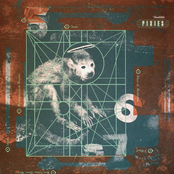Doolittle

Biography
Doolittle is the second studio album from the American alternative rock band Pixies, released in April 1989 on 4AD. The album's offbeat and dark subject material, featuring references to surrealism, Biblical violence, torture and death, contrasts with the clean production sound achieved by the then newly hired producer Gil Norton. Along with Surfer Rosa, Doolittle is considered the band's strongest work. Doolittle has continued to sell consistently well in the nineteen years since its release,...
Doolittle is the second studio album from the American alternative rock band Pixies, released in April 1989 on 4AD. The album's offbeat and dark subject material, featuring references to surrealism, Biblical violence, torture and death, contrasts with the clean production sound achieved by the then newly hired producer Gil Norton. Along with Surfer Rosa, Doolittle is considered the band's strongest work. Doolittle has continued to sell consistently well in the nineteen years since its release, and in 1995 was certified gold by the Recording Industry Association of America. The album has been cited as inspirational by many alternative artists, while numerous music publications have ranked it as one of the most influential albums ever. A 2003 poll of NME writers ranked Doolittle as the second greatest album of all time. Reaction to Doolittle was positive in general, with the album garnering praise from several major music publications. NME commented that "the songs on Doolittle have the power to make you literally jump out of your skin with excitement." Q, giving the album four stars out of five, said that Doolittle's "carefully structured noise and straightforward rhythmic insistence makes perfect sense." Tim Rolston, of the Daily Telegraph praised Doolittle as "a scintillating rock'n'roll album" and the Pixies' "finest half-hour so far." Other publications also awarded the album four out of five stars, including the British music weekly Record Mirror, The Philadelphia Inquirer, the Los Angeles Times, and the Chicago Tribune. The Village Voice's Robert Christgau gave the album a B+ rating, suggesting that "getting famous too fast could ruin them." However, Doolittle received mixed reviews from several music critics. Time Out said that "Gil Norton's toy theatre production makes a drama out of what should have been a crisis." Spin ran a hundred-word review of the album, including critic Joe Levy's comment "the insanity less surreal and more silly, and the songs themselves more like songs and less like adventures." Rolling Stone, reviewing the album in July 1988, gave the album three and a half stars. Doolittle appeared on several end-of-year "Best Album" lists; both Rolling Stone and The Village Voice placed the album tenth, and independent music magazines Sounds and Melody Maker both ranked the album as the second best of the year. NME also ranked the album highly, placing it fourth in their end-of-year list. A range of music magazines have since acclaimed Doolittle as one of the quintessential alternative rock albums of the 1980s. Rolling Stone, reviewing Doolittle again in 2002, gave the album five stars out of five, remarking that it laid the "groundwork for Nineties rock." Doolittle has received a number of international accolades and is consistently noted as one of the best albums of the 1980s in any genre. Following its release, Doolittle sold steadily in America, and broke sales of 100,000 after six months. By early 1992, while the band were supporting U2 on their Zoo TV Tour, the album was selling 1,500 copies a week. The middle of 1993, two years after the band's last album, Trompe le Monde, saw sales average 1,200 copies per week. Doolittle was certified gold by the Recording Industry Association of America in 1995. Ten years after the breakup, Doolittle was still selling between 500 and 1,000 copies a week; the reunion tour saw sales creep back up to 1,200 copies a week. At the end of 2005, best estimates put total sales in America at between 800,000 and one million copies. Doolittle features an eclectic mix of musical styles. While tracks such as "Tame" and "Crackity Jones" are fast and aggressive, and incorporate the band's trademark loud-quiet dynamic; other songs such as "Silver," "I Bleed," and "Here Comes Your Man" reveal a quieter, slower and more melodic temperament. With Doolittle, the band began to incorporate further instruments into their sound. "Monkey Gone to Heaven" features two violins and two cellos; while other tracks on Doolittle are constructed around simple chord progressions. "Tame" is based on a three chord formula; including Joey Santiago's playing a "Hendrix chord" over the main bass progression. "I Bleed" is melodically simple, and is formed around a single rhythmical repetition. Some songs are influenced by other genres of music; while "Crackity Jones" has a distinctly Spanish sound, and incorporates G# and A triads over a C# pedal, the song's rhythm guitar, played by Francis, starts with an eighth-note downstroke typical of punk rock music. Read more on Last.fm. User-contributed text is available under the Creative Commons By-SA License; additional terms may apply.




